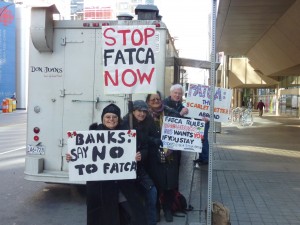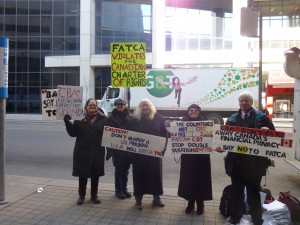photo from yesterday, day 1 of protest
PROTEST EVENING POSTMORTEM:
I know that this small protest did reach the FIsters attending the conference and put them on notice–because most refused to look us in the eye.
This protest happened because of the dedication of on-site protesters including Atticus, Marie, Northernstar, Peter, Tricia, and WhiteKat, those (including Blaze and James Jatras) who helped in preparation of the letter to the Canadian Bankers Association that was critical to the protest, and because of the others I am not certain that I can mention.
Amazing people, all.
On-site coverage from IRSCompliantForever :
15.54. A last goodbye from all of us to the banksters.
15:03. Banker from small bank who hates FATCA just signed petition.
14:24. AttIcus just explained FATCA to passerby. Response was “Well, the banks need a little (words deleted).”
14:14. Banksters we meet all express sympathy but insist that there is no way to prevent FATCA. So many passerbys wondering about this FATCA word.
13:18. Fellow from one of the major banks visited with us had a friendly chat and accepted the CBA letter. He asked that we not disclose the name of his bank. Banksters are also taking pictures of us.
12.55. Another passerby came up to us expressing concern that her daughter has a Green Card.
Reports and photos of earlier today and yesterday after the jump
12:53. A passerby just came up to us expressing concern that she was born to a US parent and asked whether FATCA applied. Atticus explained and the woman thanked us for being here.
11:23. Unexpectedly another protester arrived with signs. Someone we all know.
11:13. Police have arrived again.
10:51. Nice sunny day. One bankster inside gave us the thumbs up. We had a nice chat with two reps of a major FI who accepted the CBA letter.
***
Day 1 of Protest – Yesterday, 13 November
13:40. Stuck on a narrow curb.
13:07. New development. Head of security informed us that we had to move to the curb in which we must remain 18 inches from the street. I called the police to resolve. Three police officers came and tried to intervene with security, but security refused as walkway is technically on private property. Want to emphasize that police tried their very best to help us. We will try not to tip over on curb. Lots of interest from passerbys. Morale very high.
12:50
12:46
12:13. Above is a photo of four Brocker/Sandboxers taken by a sympathetic passerby. Note that the person holding the “Do not marry an American” sign is a guest Brocker who is a kindly non-US spouse of a US person. She strongly supports the message of the sign and wants to be known as @LauraSecord. Small group but morale is high.
11:09. Met a fellow working for a bank. He says FATCA is painful.
11:02. Tricia, Marie, NorthernStar and IRSCompliantForever just spoke to a very friendly and receptive journalist who will include mention of our protest in an article He also said that this is the first FATCA protest he is aware of. We cannot mention name of journalist. We are pointing signs at the conference room. Doors are closed now so that banksters cannot see us.
09:37. Peter is standing immediately in front of the conference meeting room. We can see them and they can see us. But we cannot enter.
07:33. Peter and I are on site. We were told us that we would be arrested if we entered building. Tried to leave CBA letters but conference organizer refused and noted that our comments on IBS about CBA were inflammatory.
***
The conference is “Canadian Institute’s 19th Annual REGULATORY COMPLIANCE for Financial Institutions” at the North Building of the Metro Convention Centre in Toronto which has been brought to our attention through the diligence of @Tricia. http://www.regulatorycomplianceforfis.com/














@atticus
The IGAs are meant to offer a basis for the banks to meet their compliance requirements. This does not not protect only the ‘bankers’, but also (some would would say primarily) their millions of ordinary shareholders, depositors, bondholders, creditors and file-and-ranke employees, all of whom would be dramatically affected if the ‘banks’ failed to comply with FATCA and saw themselves out out of business by the threat of a devastating withholding tax.
The ordinary savers, shareholders and employees of Canadian banks have the same right to see their interests considered as the US persons affected by the implementation of FATCA, would you not agree?
@JE
Your comment on Nov. 15 at 2:48
The big word to which you refer is “NO”.
FATCA is a law that specifically applies to the Canadian banks – therefore the banks should say no. You have spent three days trying to explain upside down, sideways and diagonally that somehow the banks have no choice except to comply. They obviously do have a choice – you are simply explaining why their choice is to kowtow to the IRS.
You give two reasons for this:
1. The threat of withholding (including the complications of the need to deal with other FATCA compliant banks). “They will hurt us.”;
2. The banks have a fiduciary duty to the shareholders and it is in the interests of the shareholders to obey the IRS. “I’m just doing my job.” But I have a question for you: Against this fiduciary duty to the shareholders, do the banks have a duty to act in a manner that is consistent with Canada’s laws, traditions and values? If so, is this an important consideration?
You have spent three days trying to get people to accept that the banks are the “good guys”. That the banks really don’t want FATCA. But, that really it’s not their fault – they are just doing their job – they have to comply. You then “navel gaze about the nuts and bolts of FATCA”. How does it operate, etc.
The issue is not “how” but “whether” and “when”.
The Canadian banks have made a decision to ignore Canada’s privacy and other laws for the benefit of the shareholders. Fine, but let’s agree that’s all it is. But, it’s all okay because, you know, they just have no choice. The IRS made us do it. And in any case, it’s just our job.
Your way out is to encourage the government of Canada to enter into an IGA, and change some Canadian laws to make the behavior of the banks legal. Oh yes, FATCA, you know, it’s a bad thing, but hey, the Government of Canada is the real culprit, they are making us do it.
Here’s a “FATCA Fact”:
The banks may not like FATCA but they have done nothing to oppose it. Tell me one single thing thing that either individual banks or your organization has done to actually get the U.S. Congress to abolish FATCA. Don’t you understand that the result of FATCA is that the IRS Commissioner will replace the CEO of the banks? Don’t you understand that FATCA allows the U.S. to change the rules as it goes along? It can change the definition of U.S. persons. It can change the nature of the information that it demands. FATCA allows the US/IRS to dictate anything and everything to the Canadian banks.
The banks have spent millions and millions in FATCA compliance costs to help themselves be governed by the IRS, but nothing to lobby the U.S. congress for the repeal of FATCA. It’s easy to see why those affected by FATCA are so hostile toward the banks.
The focus of your comments seems to be to get people to stop targeting the banks (they are just doing their jobs) and to focus exclusively on the Canadian Government. Given that the law applies to the banks – this suggestion is absurd. Every person and organization complicit in the FATCA rollout needs to be targeted. These include:
1. The Canadian banks – those governed by the law
2. The Canadian bankers association – the PR group for those governed by the law
3. The Government of Canada – those who can pass a law prohibiting compliance
4. Members of the Compliance complex that are the beneficiaries of FATCA – the functional equivalent of “Iraq’s former Republican Guard”.
Let’s at least be clear about what is going on.
Closing question for you:
What do you think will happen if there is no IGA or if there is no IGA before the July 1 deadline?
@JEG: It’s actually quite simple: Canadian banks don’t have the right to break Canadian banking, privacy and human rights laws “to see their interests considered.” Changing those laws would be a violation of the Charter of Rights and Freedoms.
This is also quite simple: United States does not have the right to impose its laws on Canada or any other country.
Can you imagine if Cuba, China, Russia or Iran were demanding that American banks provide such invasive information on naturalized American citizens living in United States? It’s incredible that a country which is such a strong critic of those nations is acting far worse towards those it tries to claim as its own (which many of us aren’t).
Why is it so difficult for you to understand the reverse? My ancestors from Sweden, Germany, Switzerland and Ireland were not stalked for taxes, tax reporting or intrusion into their legal bank accounts. If they had been, they would not have been able to survive, raise their American-born families and contribute to the U.S. economy.
Did your ancestors face such an attack on their personal integrity and honest financial lives from their homelands? Did the US government and banks cooperate in turning over the informatio demanded?
I may have missed it in U.S. history, but I’m not aware of that ever happening. If it did, please enlighten me with your great insight. Please share with me what was the reaction of your ancestors? If, not, what do you think their reaction would have been?
So, what gives the United States the right to impose their will on the rest of the world? Oh wait, because they’re big bullies.
The only way to deal with bullies is to stand up to them. That is what governments and banks around the world should be doing. That is what we are insisting Canadian government and banks do.
If they don’t, we will then pursue all of the legal options available to ensure our legal rights are respected and upheld.
@JEG
You are very informative with facts. You did not respond at all with empathy to @ Calgary411 and @ Atticus. There is more at stake here than profits and stockholders. Data from Star Trek Next Generation was very factual as well as Hal from 2001 A Space Oddesy. You sound so much like them. They had no feelings because they were robots. Are you saying bankers are robots and follow the orders of the USA?
We are people with families who believed in our government protecting us, our rights and property. So you are saying we are chattel and are no better than slaves.
@USCitizenAbroad
Thank you for your comment. I wish I know how to use the text editing functions like you do, but I am well and truly challenged in this area.
From my observation, the banks have not chosen to ignore Canadian privacy laws, in fact they have done exactly the opposite. They have alerted the Canadian government (and by the way the American authorities) to inform its ministers that they were facing an extremely difficult legal conflict, which could have disastrous consequences if it were left unresolved.
You make the absurd comment that, given that the law [FATCA] applies to the banks, it is fair game to target/attack the banks…. By that logic, if we oppose the death penalty, should we target/attack the inmates on death row? You will surely appreciate that this makes no sense.
I do not know what will happen if no IGA is in place by the date that the statute comes into force. Frankly, I would rather not have to find out.
@northernstar
I am so sorry that I cam across like this. I am not a robot, and I very much understand that there are a lot of emotions involved in this FATCA struggle. There is anxiety, despair, anger and many other feelings that come from every post on this blog. It would be impossible to not sense it.
Gracious I don’t want to bring harm to other clients at my credit union so that leaves me with the only option I’ve got and that is to remove my offending deposit digits from my credit union’s electronic ledger by converting those digits into cash. With my accounts closed there will be no more risk to the credit union, its employees or its clients. Then I’ll stash my cash in a good hidey-hole for safe keeping and take the location of that hidey-hole to my grave. That will permanently remove some Canadian bills from circulation but I don’t think that will harm anyone because more bills can be printed to replace them. I will probably be labelled as a criminal so I’ll have to find a hidey-hole for me too. There now, is everybody happy? My peaceful and secure retirement will be down the drain but who cares? This is when there is an advantage in getting older — fewer years ahead of me to endure.
Even though the world of FATCA tyranny looms ahead of me (it’s inevitable some say), I still plan to go into that dark existence kicking and screaming. I’ll direct my rage at banksters, compliance condors, politicians — whoever I damn well want to. They all might say I have the option of complying and handing over my life’s savings (all legally acquired, all taxes paid) to the IRS but that is absolutely NOT going to happen. EVER!
“By that logic, if we oppose the death penalty, should we target/attack the inmates on death row? You will surely appreciate that this makes no sense.”
If the inmates are doing the hanging, YES!
JEG and others:
I don’t doubt there are very real and substantial difficulties in not complying with FATCA non compliance however I do not believe there rise to level given to justify the one sided IGA process. First FATCA 30% withholding under statute(and I have a presentation deck describing this in more detail) only applies to “US source” income. Technically this includes securities(such as stocks and bonds) issued by a US company however it does not include bonds issued by a non US company even if denominated in US dollars. So to take an extreme example if British Airways issues bonds denominated in US Dollars governed by New York State law and cleared in the US/NY even in those circumstances FATCA withholding does not apply. American depository receipts of non US companies are also not subject to FATCA withholding.
FATCA withholding presentation:
http://www.slideshare.net/BroadridgeFinancialSolutions/fatca-withholding-tax-securities-justin-hopkins
(In particular look at slide number five)
Also of the 1.5 Million US state and municipal bonds outstanding only 77,000 are subject to FATCA withholding as part of a broader principle of US tax law state and municipal debt is exempt from all US federal income taxation.
Additionally where the FATCA 30% exceeds the rate normally collected under a bilateral tax treaty a non compliant FFI is entitled to a refund of the amount that exceeds the treaty withholding rate. I don’t doubt this later scenario is very complex and time consuming for the banks but from the US perspective it argued that it is what keep FATCA from being a treaty override.
@Em
I am with you all the way. It will be a cold day in hell that the USA gets any of my money that I and my husband worked so hard for. He worked all hours in blizzards and rain and heat waves putting together railroad box cars. It was a dangerous job not a bankers job. Somtimes he wotked 24 hours nonstop.
I am thinking of doing what you are thinking of doing. Yes, I will be directing my rage like you. I won’t back down ever.
I felt that you read the thoughts I hsd in my head lately.
@northernstar
I know what your husband went through, my son is a train conductor too. I’ll be damned if the US will get any of his hard earned money either. My son could have US citizenship if he wants but he won’t have anything to do with it because of how bad they treat their citizens abroad. NO WAY!
With regard to the debate the seems to be raging here about whether the banks or the Canadian government are ultimately responsible to stop FATCA in Canada, I would agree that ultimately it is the Canadian government that needs to act here (or, perhaps, refuse to act when it comes to cooperating with FATCA). A Canadian prime minister can say with an element of authority that “Canada will not participate” in a way that bankers cannot–even if they wanted to.
However, it is also clear to me that bankers are quite complicit in FATCA–that, in fact, they do want FATCA and are pushing for its implementation. Therefore they are a very reasonable target of protest here in addition to the government.
There’s a turbo charged homelander telling me that I should be happy to pay US taxes from Canada because “The U.S.A. spends a great deal more than Canada to defend itself and also Canada. Look at the money as your share of defending which ever country it is that you love.”
http://www.cnbc.com/id/101202754
Homelanders are apparently looking for remittance for all the money they’ve spent on wars to protect us all from the enemies they’ve made in the world.
@ J.E. Gutierrez
Let’s try a little “thought experiment”.
As we know, Saudi Arabia is notorious for not allowing its female citizens to drive.
Suppose that Saudi Arabia now wants any woman born in Saudi Arabia to be prevented from driving in the United States, even if these Saudi-born women are also US citizens.
So it passes a law requiring all car manufacturers in the US to screen their female customers for a Saudi place of birth, and to deny car sales to report their personal information back to Saudi Arabia.
If car manufacturers do not comply, Saudi Arabia will withhold 30% of its fuel exports to any oil company who’s gas stations serve that model of car.
Naturally, it is illegal for car manufactures and dealerships in the US to discriminate against female customers born in Saudi Arabia. However the threat of Saudi oil withholding is a significant business threat.
So they request the US government to make a deal with Saudi Arabia that makes it legal and actually required for all US car manufacturers to ask all female customers where they were born and report any Saudi-born female US citizen who attempts to buy a car to the Saudi authorities.
Will passing that law make it OK for car dealerships to discriminate against US citizens born in Saudi Arabia? Is this morally right – or even constitutional? What should the US government do. Pass the law because the car manufacturers want it, or tell the Saudi’s NO!
@JEG
I note your comments regarding mine. You are obviously considering many of the business and market challenges in this whole debate/issue. I see you are getting a lot of opposition to your views by others here, but I for one welcome your input even if I don’t see ‘eye to eye’ with you.
I agree that many international FIs have incorporated subsidiaries in places like London and in the case of the UK they will be subject to the IGA. I guess where I have trouble is believing the pass-through rules will actually work in reality. Basically as I understand it, these rules effectively expect FIs to police each other for compliance and enforce accordingly with respect to counterparty transactions. In my experience in the industry, I know it is quite common for FIs to have many (even thousands) of FI counterparties. To monitor ongoing compliance might happen somehow, but I doubt it will have any substance and I seriously doubt the IRS will have any capacity to verify compliance. In fact with all this new compliance burden coming up for everybody, I expect the IRS to be under the heaviest budget constraints. In other words, I am highly sceptical the pass-through rules will have real substance, particularly when it is likely that major market players (like China and who knows who else) simply won’t play. Also, FIs these days have plenty of challenges ensuring their own compliance with ever increasing regulations let alone trying to confirm others are and remain in compliance. While the IRS might play a point role in this by maintaining a published list of complaint and non-complaint/recalcitrant institutions, I find it hard to believe they can keep it up to date and substantiated in any reliable fashion.
As far as the US singling out some market players to be ‘examples’ for the 30% withholding. It would be possible the IRS would take that route, but it seems to me everyone would quickly understand this strategy and many would organize against such an uneven application of the IRS’s own regulations. I don’t think they get to choose some for enforcement action but not others. On the other hand, as I suggested, I think they would be committing some form of economic suicide with wide scale 30% withholding.
One final thought. You bring up what I see as the FI’s risk management or mitigation issues as their primary motivator for pushing for an IGA route for compliance with FATCA. I think they are indeed motivated mainly by those financial considerations above all else. On the other hand, many here (including myself) look at the issue of rights of Canadians and the rule of law (Canadian Law) as more important.
I suspect we can agree on one thing, being the FIs and Canadian government are both in a very tight spot over this. I would go on further to say, I think the US government (IRA & Treasury) are equally in a tight spot because they will likely find Obamacare a lot easier to implement than FATCA.
@JEGutierrez, re your comment;
http://isaacbrocksociety.ca/2013/11/02/help-appreciated-for-nov-13-14-toronto-protest-against-fatca-complicit-banks/comment-page-14/#comment-676680
You repeat this throughout;
..”The ordinary savers, shareholders and employees of Canadian banks have the same right to see their interests considered as the US persons affected by the implementation of FATCA, would you not agree?…”
You appear to mean that rhetorically because you obviously already have a position. You refer to the shareholders of Canadian banks as having the ‘same’ ‘rights’:
But, the CBA, IIAC and Canadian FI shareholder “interests” are not equal or equivalent to ‘rights’. Do corporate shareholders, and individual citizens/residents have ‘the same’ or equivalent ‘rights’ in Canada? Business and profit ‘interests’ – of shareholders, FI entities, and Canadian banks are not addressed, contemplated or enshrined in the Charter of Rights, nor in the Constitution as far as I know. There is no Charter right or entitlement to invest or engage in a profit making venture, or to make or be assured of profit. And certainly, even if there was, I think that there is still a likelihood that international and Canadian law would elevate the right to privacy, security, and the right to be free of discrimination based on parentage or birthplace/country of origin above profit. Particularly if it is a question of Canadian laws applied to Canadian legal residents and citizens on Canadian soil; vs. an extraterritorial US law applied via threat, force and what some call extortion, in Canada.
Other accountholders, employees of banks and individual shareholders, as Canadian resident and citizen individuals have the same Charter and Constitutional rights we claim here: that is – not to be discriminated against on the basis of parentage or birthplace/national origin. And not to be the unwilling subjects of what FATCA attempts to put a pseudo-legal gloss on – what I would characterize as extraterritorial extortion by a foreign power – now with the aid of Canadian banks and FIs lobbying secretly for Canada to sign an IGA. We are not asking for anything that we do not believe other Canadian citizens and legal residents deserve.
@badger
This is very well said. Thank you for clarifying this important distinction between “rights.”
J. E. Guterriez,
While we’re speaking of rights:
– Will you specifically address the rights of non-US joint-accountholders – such as spouses, family members, and business partners of those in Canada who would be targeted by mere association (with NO US tax or reporting obligations), under a FATCA IGA http://www2.macleans.ca/2013/10/31/think-sharing-bank-data-with-the-u-s-only-affects-canadian-americans-think-again/ ? I note that one of the CBA member sites FAQs states that under FATCA, the assets of an account jointly owned with a ‘US person’ will be treated as if the ENTIRE account belongs to a US person – and reported to the US Treasury/IRS, thus wholly disregarding the legal rights of the non-US co-owner. A FATCA IGA will not remedy that. See:
“How are joint accounts handled under FATCA?”
“If at least one of the joint owners qualifies as a U.S. person, any required reporting would treat the U.S. person as the owner of the entire account.”
“If more than one of the joint owners are U.S. persons, any required reporting would treat each U.S. person as the owner of the entire account.”
@JEG, Will you address the issue of the rights of Canadian born and resident minors and those deemed incompetent – whose RESPs and RDSPs respectively will be subjected to FATCA reporting, but who are prevented by US law from renouncing?
Minors may eventually renounce and be free of FATCA, but those deemed mentally/intellectually incompetent are bound for life – and thus, in Canada under FATCA IGA face the loss of their Charter rights, inevitable US extraterritorial double taxation of their disability grants, registered savings (RDSPs) and income, decades of complex US ‘foreign trust’ reporting, substantial specialty accounting and compliance costs, layers of substantial penalty potential – forever – until death, and beyond via their estates. Since these dependents are bound for decades or forever to the US, via accidents of parentage or birthplace, so too are their Canadian-only parents and guardians.
These legal local Canadian accounts are deemed to be ‘taxable foreign trusts’ by the US. A FATCA IGA will not remedy that – it will just add another layer of US extraterritorial compliance, enforcement and penalty structures on top of that already egregious injustice.
Are you saying that the privacy, Charter, constitutional, civil rights and financial security of these vulnerable groups should be sacrificed, under a FATCA IGA, for the greater good of the ‘ordinary savers, shareholders and employees of Canadian banks’ you say you are concerned about? According to your comments, it is acceptable that Canadian minors and any Canadian citizens or residents deemed legally incompetent are impacted, as long as the larger ‘majority’ are not?
As a side note; the Scotiabank FATCA page emphasizes a similar unsubstantiated claim about the impact of a FATCA IGA; “In the end, we expect FATCA to have no impact on the vast majority of our clients.” “How are joint accounts handled under FATCA?”. Since ALL Canadian taxpayers and ALL accountholders will be paying untold additional Canadian taxes and account fees in order to pay for initial and ongoing FATCA implementation and compliance forever and ever under an IGA, (including any future changes the US makes unilaterally – as per the ‘latest-in-time’ rule), is it not a distortion of fact to say that the ‘vast majority’ will be unaffected?
You repeatedly question why we protest the CBA and the like and state that they are not and should not be a legitimate target. But they have actively subverted the democratic process by working behind the scenes to urge our political representatives to expeditiously sign away our rights in secret and without our consent or public debate – and to bind ALL Canadians to an invasive, far reaching and extraterritorial foreign US law – that would make vulnerable all our personal, family and business financial information, accounts and assets, abrogate the Charter, subject minors and disabled dependents to additional US Treasury insult – and then to add insult to injury, CBA members make unsubstantiated and disingenuous claims meant to minimize the significance of FATCA and keep Canadian accountholders and taxpayers from opposing it. We have assiduously read materials produced by Canadian FIs on the topic of FATCA – including letters to the US Treasury. Very little of it refers at all to the impact on accountholders. Any mention of the impact on accountholders and asset owners was usually peripheral. It does not appear as if the FIs (except credit unions) were actually or primarily concerned about the rights or interests of any mere asset owners and accountholders per se, but rather bank profits.
@badger
Very well said. Thank you for clarifying “rights.”
Good grief – I went AWOL for much of the weekend and you wonderful Brockers have been so very active. Domestic stuff and Jamaican politics took the first chunk of my time. I hope that later today I will be able to read though all that has transpired on this blog ! JEG seems to be active ! But so are we collectively !
There is no question that the CBA are Collaborators (think Vichy France in the early 1940s) and therefore must be protested against as much as or even more than the Government itself. The CBA should be insisting on the Government protecting its members from this foreign act of financial war. The CBA should be out there actively and loudly seeking the support of the Canadian people (and the equivalents in every other country on earth). If Canada (its Constitution and Charter of Rights) does not stand for anything then the world truly has been enslaved.
@nervousinvestor, we are heading towards a FATCA Spring, where the people of the world will revolt and remove their governments from power.
@JEG – the WORLD must just say no to FATCA. Isolate the USA ! see how quickly they will come running for some more oil or food or stuff to sell in Walmart ! and worse yet if the world will not accept payment in US Dollars (that the USG can print) ! The PEOPLE of the US do not yet know what their Government is doing. I am quite sure that as soon as the PEOPLE see empty store shelves and lines to get gas for their cars they will start to make NOISE ! The Cable News Channels et al will suddenly wake up to a major story that they have been studiously ignoring. Rape is Rape. Appeasement is Appeasement. Appeasing a Rapist is not an acceptable answer – Chamberlain v Hitler.
@SwissPinoy – greetings – good (early) morning where I am yet probably good afternoon where you are I guess. A FATCA spring is sounding more and more probable if Governments and Bankers do not stand up for their Constitutions and Charters of Rights. Ultimately PEOPLE are the final deciders … even the enslaved will eventually rise up if abuse goes past a certain point. Propaganda by the Politburo is however a dangerous thing to be faced and countered.
@ALL
The latest comments on rights should be sent to CBA members and our MPs especially Flaherty and Schoom.
Thanks for writing of our rights. I for one do not believe the rights of a few should be given up for the rights of many. If we do then we are on our way away from our Constitution and Charter of Rights.
Scotiabank links in badger’s comment now work.
@badger
I found the link by googling on the Scotia website “FATCA joint accounts”.